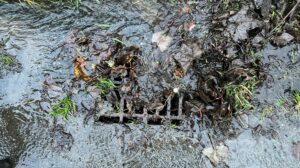This blog has been written by a member of the Newground Flood Team.
You might be surprised how many flood-related problems begin right on our doorsteps. Whether it’s blocked drains, overgrown watercourses, or what’s going down your kitchen sink, small actions really do add up when it comes to managing local flood risk.
Start with your drains
Take a walk around your home, are your gullies, downpipes, or channel drains clear of debris? Leaves, moss, soil, and even food waste can clog these up surprisingly fast, stopping water from draining properly and increasing the risk of surface flooding. Domestic drains are your responsibility up to where they connect to the public sewer, so regular checks and cleaning can go a long way. Did you know the maintenance for private drainage is the responsibility of the householder up to the point of connection to the public sewer?
If you use gravel or bark in your garden, try to keep it contained. These materials often get washed into drains during heavy rain, leading to blockages. If you notice that water tends to pool in certain areas after rain, it might be a sign that your drains aren’t working as they should.

Check your street too
Those little iron grates along the road (called highway gullies) can quickly get blocked by leaves, litter, or road runoff. Councils like Lancashire County Council maintain hundreds of thousands of them, so they rely on residents to report issues. If you see a blocked gully or flooding on your street, report it online to your local highway authority, they’ll log the location and arrange for it to be cleared.
You can also help by keeping leaves, grass cuttings and litter away from kerbs near your home. Even sweeping the pavement in front of your house can help reduce the amount of debris entering the drainage system during rainfall.
Live near a river, stream or ditch? You might be a riparian owner.
Owning land next to a watercourse comes with legal responsibilities to let water flow naturally and prevent blockages. That means keeping the channel clear of obstructions, removing fly-tipped material, and not dumping garden waste into the water. If you are a riparian owner (own property which has a watercourse within or adjacent to the boundaries of your property) you have certain responsibilities to ‘let water flow naturally’. This includes removing or reporting blockages if they increase flood risk or change the flow of the watercourse to neighbouring properties. If you see anything that could pose a risk, like a blocked culvert, dumped rubbish, or fallen trees, report it to the relevant authority. The Environment Agency deals with main rivers, while ordinary watercourses are managed by the Lead Local Flood Authority.
Click here to download the ‘Riparian Ownership: A basic guide to owning and managing a watercourse’ resource.
More things you can do to manage flood risk at home:
And don’t forget the kitchen and bathroom!
What you pour down the sink or flush down the toilet really matters. Fats, oils and grease should be left to cool, then scraped into the bin, never rinsed down the drain. Wipe greasy pans with kitchen roll before washing them, and avoid flushing anything except the 3P’s (pee, poo, and toilet paper). Items like wet wipes, cotton buds, and sanitary products don’t break down in water and can cause serious blockages when they combine with fats and other debris in the sewers, creating fatbergs that are expensive and unpleasant to remove.
With United Utilities managing over 77,000km of sewers in the North West alone, it’s a huge job to keep everything flowing smoothly, and we can all do our bit to help.
Working Together Across the Catchment
Managing flood risk isn’t just about what happens outside our own homes, it’s something that needs to be tackled across the whole catchment, from the hills where water begins its journey to the rivers and drains that pass through our neighbourhoods. Risk Management Authorities such as the Environment Agency, Lead Local Flood Authorities, and water companies carry out major projects like river restoration, flood defences, and large-scale SuDS schemes, but these alone aren’t enough. Everyone has a role to play. Small changes, like keeping drains clear, disposing of waste correctly, or making space for water in our gardens, all add up to make a big difference. Managing water better across the whole catchment helps manage flood risk, protect communities, and support a healthier environment.
Click here to download our ‘Helping to reduce flood risk’ resource.